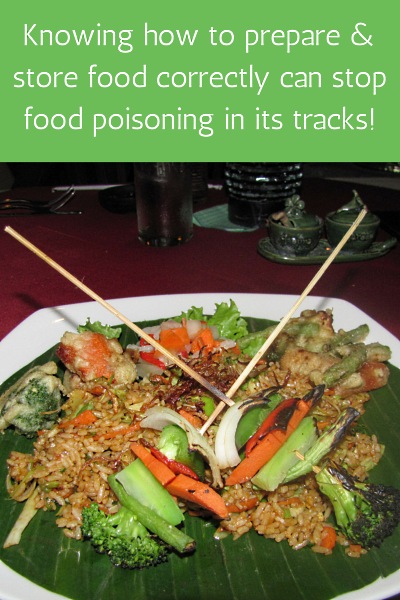 Yes You Can Avoid Food Poisoning
Yes You Can Avoid Food Poisoning
Millions of people around the world are struck down with food poisoning each year. Many of these poisonings can be avoided simply by following some simple, yet very effective food hygiene and safety practices as recommended by International Head Chef, plus an Occupational Health & Safety Manager for the Convention Center in Melbourne, Australia Mr. Sharon Friedman. Read on to see how – Yes You Can Avoid Food Poisoning .
Experiencing a bout of food poisoning is absolutely miserable and often we are our own worst enemy, as the way we handle, cook and store our food is just not up to scratch, but in many cases it could have been avoided if we had knowledge of the proper way we should all store, cook, freeze and thaw food.
Food Safety by Sharon Friedman
Each year in Australia there are thousands of cases of food poisoning. The people who are most likely to suffer from food poisoning are: People who are already ill, the elderly, the very young and pregnant women. Symptoms of Food Poisoning include: vomiting , diarrhoea, nausea, headaches, cramps, high temperatures and stomach pains.
Food Spoilage & Food Poisoning
Both raw and processed, deteriorate with time and eventually they will be unsuitable for human consumption. This refers to food we call ‘off’ — this means food looks bad (moldy, slimy), smells bad or has an “off” taste. Food poisoning has occurred when a person has become ill after eating or drinking poisoned food, which may have tasted, looked and smelt fine.
We can tell when food is spoilt but we cannot tell when food is poisoned. This is why we must set and maintain high standards of hygiene to reduce the risk of food becoming contaminated. Food is usually contaminated one of 3 ways.
These can be chemical, physical or microbiological.
Main Causes of Food Poisoning:
- Food Handlers suffering from illness respiratory or gastro bugs.
- personal hygiene.
- Inadequate temperature control
- storage and service of food
- Incorrect and unsafe food handling practices
- Purchasing food from disreputable supplier
- Unclean food premise and equipment
- Contamination from food, pests and rodents
Preventing Food Poisoning Tips:
1. Temperature: Temperature control is one of the most important things you can do to prevent food poisoning. Most Bacteria like to grow and reproduce between 5ºC and 60ºC. This is known as the “Danger Zone”. Stop bacteria building up to large numbers by keeping food out of the danger zone. They reproduce fastest at around 37ºC normal human body temperature.
2. Killing Bacteria: Cold does not kill bacteria but heat does, the hotter the temperature and the longer the time the more you kill. Most are killed when you heat to above 75ºC.
3. Washing Hands Properly: Warm – Hot Water Soap Rub together Rinse
4. Cross Contamination: Cross contamination is the transfer of bacteria or other micro-organisms from one food or area to another food or area. Example: A dirty chopping board will cross contaminate the next food placed on it. If you touch raw food like chicken then touch ready to eat food like a sandwich without washing hands or changing gloves (also wash hands) you transfer bacteria onto the sandwich. Storing raw meats above cooked food in a fridge may result in the meat dripping onto the cooked food. Not washing knives or utensils between tasks.
5. First in–First out – FIFO In hospitality the term FIFO refers to stock rotation. That means to use the stock which was delivered first gets used before new stock which has just been delivered. First In–First Out To do this effectively it’s a good idea to date label the food as you prepare food or when the food is delivered. Some item such as packaged cans and bags of food may already have a use by or best before date that can be referred to. FIFO helps ensure that food does not just sit there and become old, off and unusable.
6. Refrigeration Temperature 0ºC to 5ºC. Keep raw food below cooked food. Cover and date the food Don’t pack food too tightly, allow air to circulate. Clean regularly. Check for mold on shelves, seals and walls. Store foods, which may contain soil such as vegetables, so soil cannot fall onto other foods.
Before you leave, if you enjoyed this article sign up to LivingSafe and stay informed! LivingSafe helping you live healthier & safer.
Articles you may find interesting are;
Raw Coconut Oil Health Benefits and Uses
Cleaning Your Home Naturally & Safely With Vinegar and Bicarb
Why Organic Food Really is Healthier.
Browse more helpful articles in my Personal Care section here and for more information on natural healthy eating see my Natural Nutrition section.
Leave a Reply
You must be logged in to post a comment.